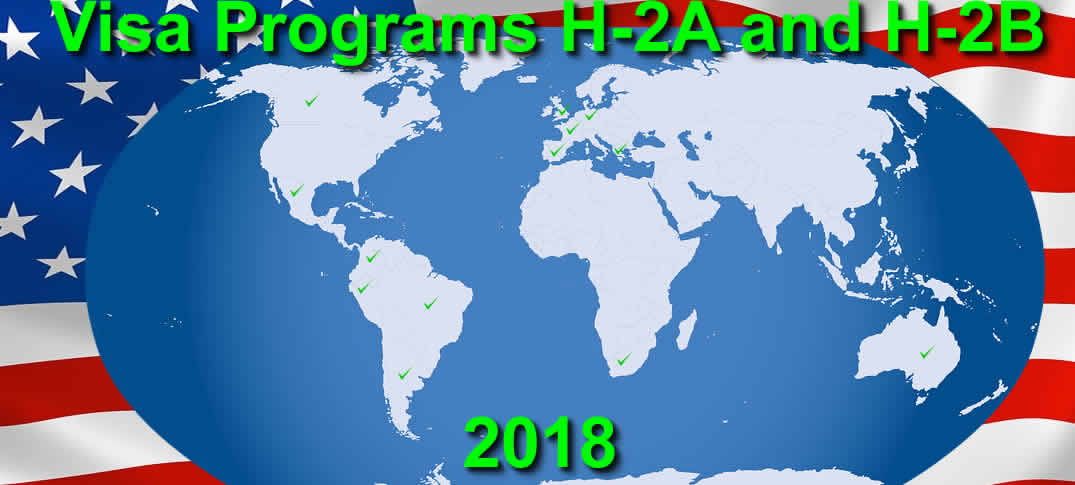Countries Eligible for the H-2A and H-2B Visa Programs Year 2018

USCIS and the Department of Homeland Security (DHS), in consultation with the Department of State, have published the list of countries whose nationals are eligible to receive H-2A and H 2B visas in 2018. The notice listing the eligible countries was published on Jan. 18, 2018, in the Federal Register.
For 2018, Secretary of Homeland Security Nielsen and Secretary of State Tillerson have agreed:
- To add Mongolia to the list of countries eligible to participate in the H-2A and H-2B visa programs
- To no longer designate Belize, Haiti, and Samoa as eligible countries because they are not meeting the standards for the H-2A and H-2B visa programs.
DHS reserves the right to add countries to the eligible countries list at any time, and to remove any country at any time DHS determines that a country fails to meet the requirements for continued designation.
H-2A and H-2B visas allow U.S. employers to bring foreign nationals to the United States to fill temporary agricultural and nonagricultural jobs, respectively. Typically, USCIS approves H-2A and H-2B petitions only for nationals of countries that the Secretary of Homeland Security has designated as eligible to participate in the programs. However, USCIS may approve H-2A and H-2B petitions for nationals of countries not on the list on a case-by-case basis if it is determined to be in the interest of the United States.
Effective Jan. 18, 2018, nationals of the following countries are eligible to receive H-2A and H 2B visas:
| Alemania | Andorra | Argentina |
| Australia | Austria | Barbados |
| Bélgica | Brasil | Brunei |
| Bulgaria | Canadá | Chile |
| Colombia | Corea del Sur | Costa Rica |
| Croacia | Dinamarca | Ecuador |
| El Salvador | Eslovaquia | Eslovenia |
| España | Estonia | Etiopía |
| Finlandia | Fiyi | Francia |
| Granada | Grecia | Guatemala |
| Honduras | Hungría | Irlanda |
| Islandia | Islas Filipinas | Islas Salomón |
| Israel | Italia | Jamaica |
| Japón | Kiribati | Letonia |
| Liechtenstein | Lituania | Luxemburgo |
| Macedonia | Madagascar | Malta |
| México | Moldavia* | Mónaco |
| Mongolia | Montenegro | Nauru |
| Nicaragua | Noruega | Nueva Zelanda |
| Países Bajos | Panamá | Papúa Nueva Guinea |
| Perú | Polonia | Portugal |
| Reino Unido | República Checa | República Dominicana |
| Rumanía | San Marino | San Vicente y las Granadinas |
| Serbia | Singapur | Sudáfrica |
| Suecia | Suiza | Tailandia |
| Taiwan** | Timor-Leste | Tonga |
| Turquía | Tuvalu | Ucrania |
| Uruguay | Vanuatu | |
*Moldova is designated to participate in the H-2A program, but it is not eligible to participate in the H-2B program.
**With respect to all references to “country” or “countries” in this document, it should be noted that the Taiwan Relations Act of 1979, Pub. L. No. 96-8, Section 4(b)(1), provides that “[w]henever the laws of the United States refer or relate to foreign countries, nations, states, governments, or similar entities, such terms shall include and such laws shall apply with respect to Taiwan.” 22 U.S.C. § 3303(b)(1). Accordingly, all references to “country” or “countries” in the regulations governing whether nationals of a country are eligible for H-2 program participation, 8 C.F.R. § 214.2(h)(5)(i)(F)(1)(i) and 8 C.F.R. § 214.2(h)(6)(i)(E)(1), are read to include Taiwan. This is consistent with the United States’ one-China policy, under which the United States has maintained unofficial relations with Taiwan since 1979.
This notice does not affect the status of beneficiaries who currently are in the United States in H-2A or H-2B status unless they apply to change or extend their status. Each country’s designation is valid for one year from Jan. 18, 2018.
